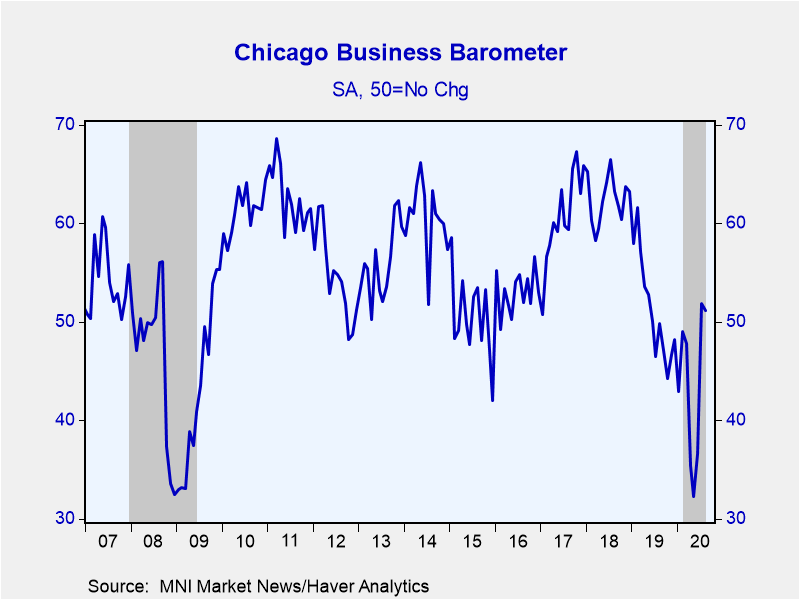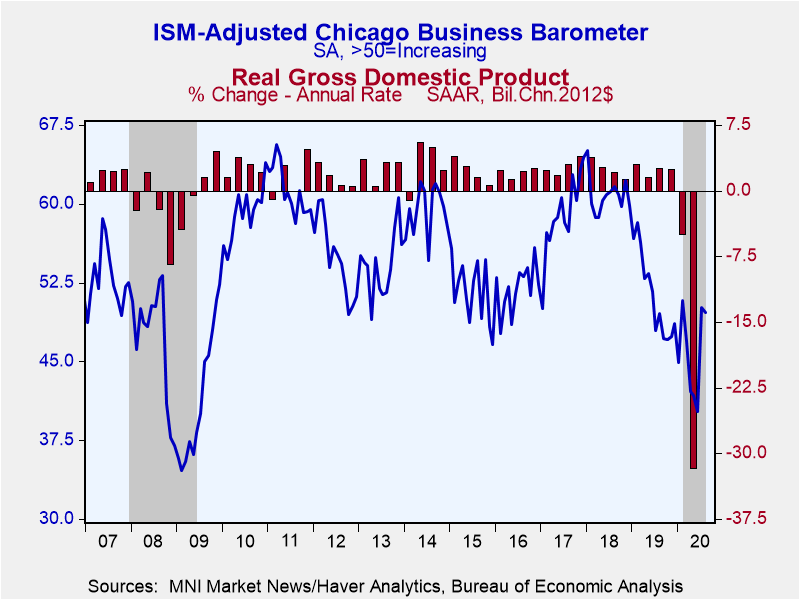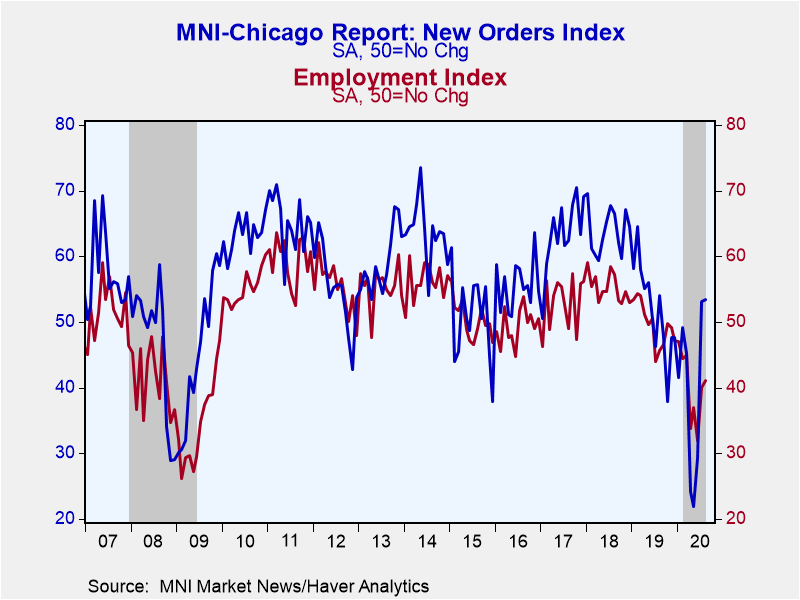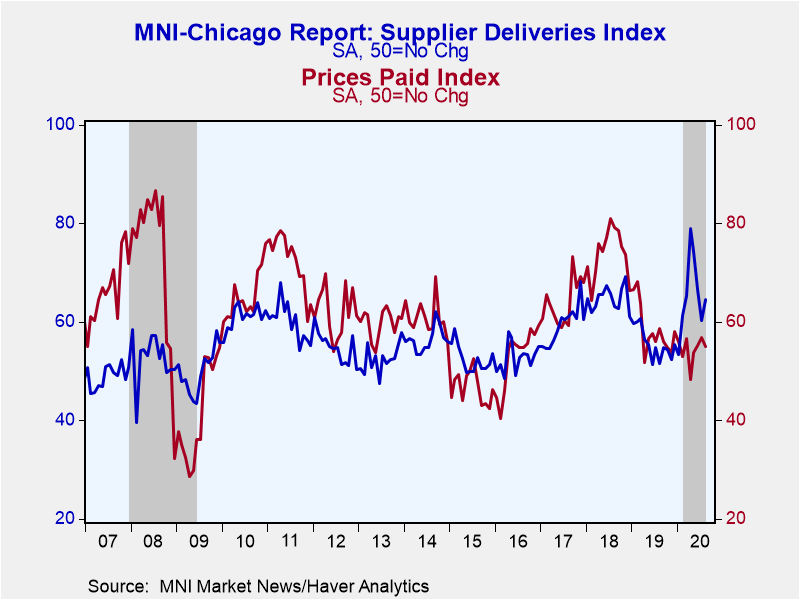 Global| Aug 28 2020
Global| Aug 28 2020The Chicago Business Barometer Takes a Breather in August
Summary
• Business activity remains in expansion mode. The Chicago Purchasing Managers Business Barometer eased to 51.2 in August from 51.9 in July. This is the second month above 50 since June 2019. A reading above 50 suggests rising [...]
• Business activity remains in expansion mode.
The Chicago Purchasing Managers Business Barometer eased to 51.2 in August from 51.9 in July. This is the second month above 50 since June 2019. A reading above 50 suggests rising activity in the Chicago area.
Haver Analytics constructs an ISM-Adjusted Chicago Business Barometer with similar methodology to the ISM Composite Index, designed to provide for better comparability across regions with the national ISM index. This measure dipped below 50 in August to 49.7 from 50.1 in July. With the exception of February and July, the ISM-Adjusted has been consistently below the 50-mark since June of last year.
The details of the report provide a mixed picture. Production improved further in August, to 52 from 50.6 in July, the highest point since June 2019, and new orders edged up slightly to 53.5 from 53.1 in July. The backlog of orders slipped and has been in contraction since August of last year. Inventories fell 9 points to the lowest point since March, suggesting that companies continue to draw down their stocks. Employment edged up slightly to 41.1 from 40.1 in July, but has been in contraction mode since June 2019. Not surprisingly, in the past few months, respondents have linked staff reductions to the COVID-19 pandemic. Supplier deliveries jumped to 64.5 in August from 60.3 in July, pointing to continued difficulties associated with the pace of product delivery.
On the inflation front, prices paid eased to 55 in August from 56.9 in July, following three consecutive months of price increases.
To the August special question of “When do you expect to get back to normal capacity?” 55.6% of the respondents expect operating at full capacity in 2021 or later and 26.7% are back to normal capacity already.
The MNI Chicago Report is produced by MNI in partnership with ISM-Chicago. The survey is collected online each month from manufacturing and non-manufacturing firms in the Chicago area. Summary data are contained in Haver's USECON database, with detail including the ISM-style index in the SURVEYS database.
| Chicago Purchasing Managers Index (%, SA) | Aug | Jul | Jun | Aug '19 | 2019 | 2018 | 2017 |
|---|---|---|---|---|---|---|---|
| General Business Barometer | 51.2 | 51.9 | 36.6 | 49.8 | 51.3 | 62.4 | 60.8 |
| ISM-Adjusted General Business Barometer | 49.7 | 50.1 | 40.2 | 49.6 | 51.4 | 60.8 | 59.0 |
| Production | 52.0 | 50.6 | 33.8 | 48.5 | 51.2 | 64.5 | 64.2 |
| New Orders | 53.5 | 53.1 | 29.3 | 54.1 | 52.0 | 63.8 | 63.4 |
| Order Backlogs | 46.2 | 47.2 | 31.9 | 50.1 | 46.9 | 58.0 | 55.2 |
| Inventories | 37.3 | 46.3 | 39.4 | 48.1 | 48.7 | 55.4 | 54.9 |
| Employment | 41.1 | 40.1 | 31.9 | 45.6 | 49.6 | 55.3 | 52.9 |
| Supplier Deliveries | 64.5 | 60.3 | 66.7 | 51.6 | 55.6 | 64.8 | 59.4 |
| Prices Paid | 55.0 | 56.9 | 55.2 | 58.7 | 58.5 | 73.9 | 64.0 |
Kathleen Stephansen, CBE
AuthorMore in Author Profile »Kathleen Stephansen is a Senior Economist for Haver Analytics and an Independent Trustee for the EQAT/VIP/1290 Trust Funds, encompassing the US mutual funds sponsored by the Equitable Life Insurance Company. She is a former Chief Economist of Huawei Technologies USA, Senior Economic Advisor to the Boston Consulting Group, Chief Economist of the American International Group (AIG) and AIG Asset Management’s Senior Strategist and Global Head of Sovereign Research. Prior to joining AIG in 2010, Kathleen held various positions as Chief Economist or Head of Global Research at Aladdin Capital Holdings, Credit Suisse and Donaldson, Lufkin and Jenrette Securities Corporation.
Kathleen serves on the boards of the Global Interdependence Center (GIC), as Vice-Chair of the GIC College of Central Bankers, is the Treasurer for Economists for Peace and Security (EPS) and is a former board member of the National Association of Business Economics (NABE). She is a member of Chatham House and the Economic Club of New York. She holds an undergraduate degree in economics from the Universite Catholique de Louvain and graduate degrees in economics from the University of New Hampshire (MA) and the London School of Economics (PhD abd).
More Economy in Brief
 Global| Feb 05 2026
Global| Feb 05 2026Charts of the Week: Balanced Policy, Resilient Data and AI Narratives
by:Andrew Cates










